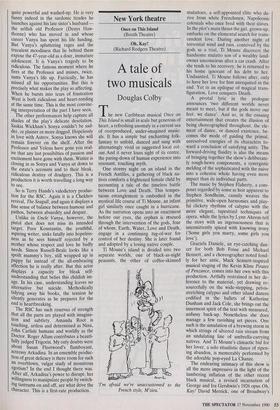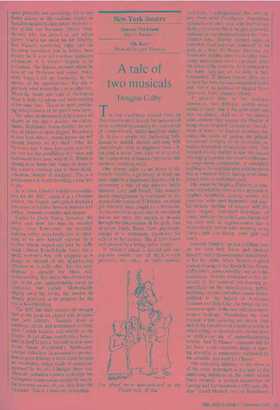New York theatre
Once on This Island (Booth Theatre) Oh, Kay!
(Richard Rodgers Theatre)
A tale of two musicals
Douglas Colby
The new Caribbean musical Once on This Island is small in scale but generous of heart, a refreshing anomaly in a current sea of overproduced, under-imagined music- als. It has a simple but enchanting folk- fantasy to unfold, danced and sung with alternatingly vivid or suggested local col- our.And it never loses sight of its centre, the paring-down of human experience into resonant, touching myth. One stormy night on an island in the French Antilles, a gathering of black na- tives comforts a frightened female child by recounting a tale of the timeless battle between Love and Death. This tempes- tuous entanglement is embodied in the mystical life course of Ti Moune, an infant girl similarly once caught in a hurricane. As the narration opens into an enactment before our eyes, the orphan is rescued through the intervention of the gods, four of whom, Earth, Water, Love and Death, engage in a continuing tug-of-war for control of her destiny. She is later found and adopted by a loving native couple.
Ti Moune's island is divided into two separate worlds, one of black-as-night peasants, the other of coffee-skinned `I'm afraid we're unaccustomed to the French style, M'sieu.' mulattoes, a self-appointed elite who de- rive from white Frenchmen, Napoleonic colonials who once bred with their slaves. In the plot's main thrust the girl, grown-up, embarks on the elemental search for trans- cendent love. During another night of torrential wind and rain, contrived by the gods as a trial, Ti Moune discovers the handsome mulatto son of a wealthy land- owner unconscious after a car crash. After she tends to his recovery, he is returned to his home ignorant of his debt to her. Undaunted, Ti Moune follows after, only to have her love for him unrequited in the end. Yet in an epilogue of magical trans- figuration, Love conquers Death.
A pivotal lyric in the prologue announces 'two different worlds never meant to meet, but if the gods move our feet, we dance'. And so, in the ensuing entertainment that creates the illusion of being choreographed throughout, the ele- ment of dance, or danced existence, be- comes the mode of guiding the primal, unresolved energies of its characters to- ward a conclusion of satisfying unity. The forward-driving fluidity is also the means of bringing together the show's deliberate- ly rough-hewn components, a synergistic melding of the sophisticated with the naive into a cohesive whole having even more impact than its individual parts.
The music by Stephen Flaherty, a com- poser regarded by some as heir apparent to Stephen Sondheim, cannily weaves the primitive, wide-open harmonies and play- ful clickety rhythms of calypso with the more elegant, tapestried techniques of opera, while the lyrics by Lynn Ahrens tell the story with an ingenuousness that is intermittently spiced with knowing irony (Some girls you marry, some girls you love').
Graciela Daniele, an eye-catching dan- cer for both Bob Fosse and Michael Bennett, and a choreographer noted fond- ly for her antic, Mack Sennett-inspired musical staging of the Kevin Kline Pirates of Penzance, comes into her own with this production. Artfully restrained in her de- ference to the material, yet drawing re- sourcefully on the wide-stepping, pelvis- stretching calypso and other island dances codified in the ballets of Katherine Dunham and Jack Cole, she brings out the innermost spirit of the text with measured, unfussy back-up. Nonetheless she does manage a few ravishing set pieces. One such is the simulation of a brewing storm in which strings of silvered rain stream from an undulating line of umbrella-carrying natives. And Ti Moune's climactic bid for her lover, a solo ritualistic dance of ripen- ing abandon, is memorably performed by the adorable pop-eyed La Chanze.
The endearing intimacy of this show is all the more impressive in the light of the lumbering inflation of the other recent black musical, a revised incarnation of George and Ira Gershwin's 1926 opus Oh, Kay! David Merrick, one of Broadway's
























































 Previous page
Previous page